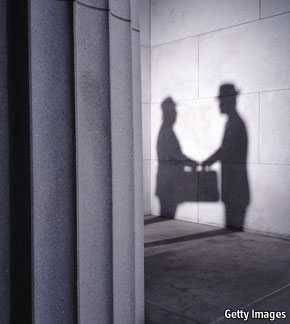Corporate standards are more liable to slip when times are tough: 15% of surveyed firms think cash payments to win business can be justified if they help companies to survive an economic downturn, compared with 9% last year. One in 20 think the same of misstating their financial performance.

corruption and bribery
Bribery would be less of a problem if it wasn’t also a solid investment. A new paper by Raghavendra Rau of Cambridge University and Yan Leung Cheung and Aris Stouraitis of the Hong Kong Baptist University examines 166 high-profile cases of bribery since 1971, covering payments made in 52 countries by firms listed on 20 different stockmarkets.
Bribery offered an average return of 10-11 times the value of the bung paid out to win a contract, measured by the jump in stockmarket value when the contract was won. America’s Department of Justice found similarly high returns in cases it has prosecuted.
Returns depend on which officials are having their palms greased. Higher-ranking officials get bigger bribes not only in cash terms but also as a proportion of the value of the contracts they dish out, with heads of state securing up to 4.7% of the contract value compared with just 1.2% for low-ranking officials.
Senior officials also capture more of the benefit from graft, typically taking over 50% of the returns from contracts they hand out; their subordinates capture just 20% of the value.
The size of bribes is also affected by the institutional set-up in each country. Cash bribes are bigger in poorer countries with larger armed forces and higher customs burdens. The authors suggest such countries typically have weaker institutions and less constrained government officials. Bribers pay more, both in cash terms and as a share of project value, when there is lower newspaper circulation at home.
Not all dirty money is spent equally well. The authors find that firms with better overall financial performance outperform in this area, too, getting better value for their bribes. Returns are also higher where overall levels of bribery are held down by greater disclosure and director liability, perhaps because such scrutiny deters entry into the bribe-paying market by other firms.
The problem is getting caught. Another paper, by Jonathan Karpoff of the University of Washington, Scott Lee of Texas A&M University and Gerald Martin of American University, found that American firms facing bribery-enforcement action lose 9% of their market value, mostly because they have other problems with misrepresentation and fraud.






